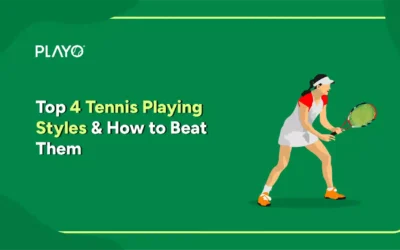TIPS FOR TENNIS MENTAL FITNESS. A tennis player generally does well in practice when the mood is relaxed, but can’t handle nervous breakdown when playing a match. As a result, their performance suffers.
The point is mastering the mental segment of this beautiful game can become more challenging than the physical aspect for most of the young players.
Here I have tried to list ten tips on how to hold on to your nerves, relax, and reach full potential when playing a competitive tennis match.
1) The Ideal State of Mind
Your main focus on the court has to be both physical relaxation and mental toughness at the same time.
Physical relaxation helps to swing through your shots in a natural flow.
Mental focus helps you concentrate on the job in hand.
It is essential to remember this state of mind and body as a “place” where you have to go back at the start of each point in a game. To master this art, you have to consciously prepare your brain initially, until the process becomes second nature.
2) Rituals and Repetition
For some players, rituals can be a great way to reset the mind and to slow down so that he/she is not rushing, which is a common challenge to tackle the nerves. By ritual, it’s not always something religious or superstitious, It’s actually adopting a little routine that you have to maintain to restore your mental harmony.
For example, when serving, a player has a great chance to regain his/her equilibrium and focus. It’s the server who is in control of the game as nothing can happen until they play the ball. A nervous player will make the mistake to rush to their service before being settled or launch themselves into the next point while thinking about the previous point they played.
That’s why it’s often a nice idea to follow your own little ritual before serving. Something as simple as bouncing the ball three times might help you to maintain the rhythm. It will help you to slow yourself down and reset your mental stability.
While learning, you will do something consciously, but later that habit goes subconscious. Tennis shots are no different.
The more you will practice them, there is more chance to play the shots without over-thinking. This practice takes place over weeks and months, not at all in the days or hours before the match.
3) Be in The Moment
When points are coming, you need maintain your focus on what’s going on the court right at that moment and perhaps anticipate what will happen in the next 5 or so seconds.
If you can’t break out from what happened in the last point, game, or set, you can’t concentrate on what’s happening now.
If you start to think about off court incidents, then you will ultimately lose focus.
What is gone is gone, what is to be will be, in between every point you task is to return to your “place of relaxed focus”.
And if you lose focus, the only way to recover your mental balance is to use the space between points.
4) Regular Match Practice
Tennis matches are the same like any other sports: the more regularly you play them, the more they incorporate into your everyday life and as a result of this the less nervous you will be.
You don’t have to be put off if you are having problems like beginner’s nerves, if you persevere and play more matches, the nervousness will slowly go away of their own accord almost in all cases.
You might like: How A Game Of Tennis Can Swiftly Improve Your Mood?
5) Be Prepared
Make sure that you are carrying everything you need ahead of the match. Suddenly discovering during the match that you have missed out on something that you need, can destroy the momentum and shift your focus.
Write out a list on paper, if that helps. Examples of things on the list might be:
Rackets
Balls
Towel
Spare shirt, hat, or other clothing
Drinks and snacks
Sunglasses
Hand grip
Sun block
Bug repellent
Once you enter the court, have some pre-match warm up to relax a bit physically and start focusing mentally.
6) Don’t Overdo Your Warm Up
There has to be a certain limit while warming up. Generally, you would want to loosen up and stretch your muscles, particularly arms and legs and get your heart pumping a little.
But when you’re nervous, there is a tendency to overdo it. This may happen with playing too much earlier in the day or the day before. Factors like fitness and shot skills find their rhythm in the weeks and months ahead of the match, not in final hours.
If the match is important, you have to practice rigorously in the weeks beforehand, but in general, it will be great to ease off for a day or two just before your match and keep it a light one.
Check out: Breaking Down The Different Eras Of The Mighty ‘Tennis Big Four’
7) Go Conservative if You’re Going Through a Rough Patch
If you have become error prone because of your nerves, it will lead to a negative loop.
You will try your best to unleash a winning shot hoping that a spectacular winner will ease your frayed mind, but in reality, you end up hitting the ball into the net or landing it out.
So the next time you try even harder to play a wonderful shot, but the same thing happens. Before you can realize, you are trying harder and harder, hitting almost everything into the net or out of court, and your nerves start to collapse.
The solution in this situation is to just roll back your game and return to basics. Try to focus on hitting a solid shot, it can be a deep forehand or backhand that will land three or four feet from your opponent’s baseline. Your opponent can perhaps get it back to you, but they can’t do anything to secure a point.
You don’t have to go for a winner every shot. If you can keep the rally going, you will rediscover your rhythm and then try more adventurous shots again when you have regained some of your confidence.
8) Right Strategy During the Down Times
When you are about to serve or receive is most of the times not the best moment to plan a new major strategy, if you want to change the course of the play. Rather you focus mainly on your shots, positioning, and the rally at that time. Utilise the down time between end changes and sets to chalk out what you want to change.
9) Slow Down
Nervous or anxious players generally try to rush everything. The nervous mind is speeding and the heart is pounding, so it’s quite natural to start making errors because you are just rushing things.
If that’s the situation then it’s often the right thing to find ways to slow down so that you can focus your mind better, and in the process start to relax a bit.
As mentioned earlier, small rituals like bouncing the ball a set number of times before you serve can help when you are on the court.
10) Positive Frame of Mind
It’s easy to fall into a negative frame of mind when your nerves are shaking. You can be excessively self-critical, which actually makes things worse, and will guide you into a downward spiral.
The wise thing is to think about psychological strategies for lifting your spirit if and when your anxiety taking a toll and morale starts to slip downwards.














